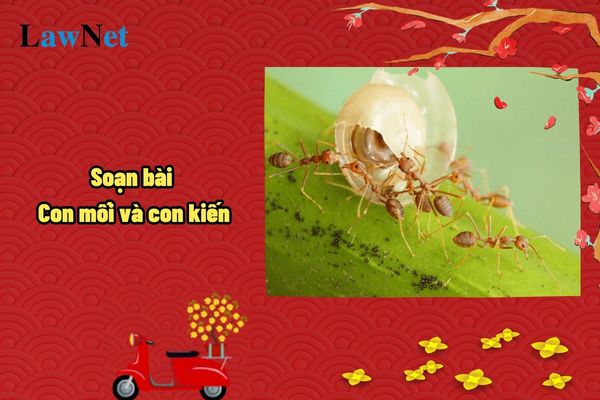What are the guidelines for preparing the lesson "Con mối và con kiến"?' How are 7th-grade students in Vietnam commended?
What are the guidelines for preparing the lesson "Con mối và con kiến"?
7th-grade students may refer to the following sample lesson "Con mối và con kiến":
|
Guidelines for preparing the lesson "Con mối và con kiến" I. Summary of the Lesson: |
*Note: The information is for reference only./.

What are the guidelines for preparing the lesson "Con mối và con kiến"?' How are 7th-grade students in Vietnam commended? (Image from the Internet)
How are 7th-grade students in Vietnam commended?
Under Article 15 of Circular 22/2021/TT-BGDDT:
Commendations
1. Principals shall award certificates of achievement for students
a) End-of-year commendation
- Award the title “Học sinh Xuất sắc” (Excellent student) for students who have obtained Excellent training and learning results for the entire school year and achieved DTBmcn of at least 9.0 in subjects that are assessed via both feedback and scores.
- Award the title “Học sinh Giỏi” (Good student) for students who have obtained Excellent training and learning results for the entire school year.
b) Commend students for having unexpected merits in training and learning in the school year.
2. Students with special achievements shall be considered and requested for commendation by schools.
Thus, under the regulations above, 7th-grade students in Vietnam will be commended based on their ability and scores throughout the school year.
What works may be selected for the 7th-grade Literature curriculum in Vietnam?
According to Section IX of the Appendix on the General Education Program in Literature issued with Circular 32/2018/TT-BGDDT, the following works may be selected for the 7th-grade Literature curriculum in Vietnam:
GRADES 6 AND 7
Stories, Novels
- The Last Lesson (A. Daudet)
- Blue Lotus (Son Tung)
- My Little Sister's Painting (Ta Duy Anh)
- The Little Match Girl (H. Andersen)
- Southern Forest Land (Doan Gioi)
- The Adventures of A Cricket (To Hoai)
- Unexpected Event (Nguyen Nhat Anh)
- The Frog in the Well (Vietnamese fable)
- The Flag Embroidered with Six Golden Words (Nguyen Huy Tuong)
- Hanging a Sign (Vietnamese folk humor story)
- The Old Man and the Sea (A. Puskin)
- Saint Giong (Vietnamese legend)
- Thach Sanh (Vietnamese folktale)
- ...
Poetry, Folk Poetry, Proverbs
- Folk poetry about love and family affection
- Night Scene (Ho Chi Minh)
- The Poem about the Non-glass Squadron (Pham Tien Duat)
- Advice to My Child (Tran Nhuan Minh)
- The Journey of Bees (Nguyen Duc Mau)
- When the Prisoner Sings (To Huu)
- Cloud and Wave (R. Tagore)
- Mother (Do Trung Lai)
- The Sail (Hoang Trung Thong)
- Homeland (Te Hanh)
- Son Tinh, Thuy Tinh (Nguyen Nhuoc Phap)
- Echo (Nguyen Quang Thieu)
- Vietnamese proverbs
- Visiting Uncle Ho's Mausoleum (Vien Phuong)
- ...
Memoirs, Essays
- Vietnamese Bamboo (Thep Moi)
- Leaf Domain (Do Phan)
- Co To (Nguyen Tuan)
- Love for the Homeland (I. Ehrenburg)
- One Liter of Tears (Kito Aya)
- The Man Waiting at the Front Porch (Huynh Nhu Phuong)
- The Primary School Years (excerpt from Nguyen Hien Le's Memoirs)
- Deep in Hong Ngai (Tong Lam Linh)
- Nostalgia for Twelve (Vu Bang)
- I Had Tet in Con Lon (Khuong Viet)
- A Noon Away from Home (Tran Cu)
- ...
Argumentative Essays
- A social argumentative essay: about a phenomenon of interest.
- A literary argumentative essay: analyzing characters and works.
- Chief Seattle's Letter (Seattle)
- The Simplicity of Uncle Ho's Virtue (Pham Van Dong)
- The Wealth and Beauty of the Vietnamese Language (Dang Thai Mai)
- The Spirit of Patriotism of Our People (Ho Chi Minh)
- ...
Informative Texts
- A historical event narrative text (expository).
- An introduction to a rule or regulation in games or activities (expository).
- A petition; minutes, messages, emails.

